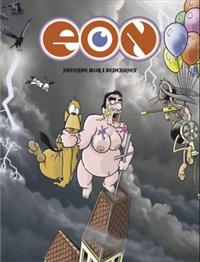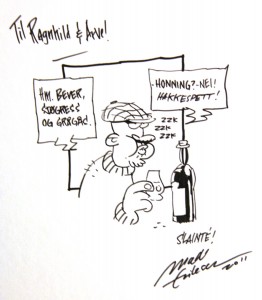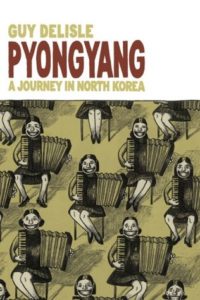 It’s been six years since I read Guy Delisle’s Burma Chronicles and was ambivalent about it. When picking up a selection of graphic novels at the library recently, I decided it was time I gave him another chance and borrowed Pyongyang: A Journey in North Korea, since North Korea is interesting. I sort of regret it now, but I won’t give him the benefit of the doubt again. Because all the stuff that bothered me in the Burma Chronicles bothered me even more in Pyongyang, and it was joined by a casual racism (calling the performing children «savant monkeys»!) and blatant misogony that completely undermines any point Delisle may have had to make. I mean, who recounts a series of torture techniques in drawing and writing and then writes this down and thinks, «Yeah, that’s the vibe I’m going with»?
It’s been six years since I read Guy Delisle’s Burma Chronicles and was ambivalent about it. When picking up a selection of graphic novels at the library recently, I decided it was time I gave him another chance and borrowed Pyongyang: A Journey in North Korea, since North Korea is interesting. I sort of regret it now, but I won’t give him the benefit of the doubt again. Because all the stuff that bothered me in the Burma Chronicles bothered me even more in Pyongyang, and it was joined by a casual racism (calling the performing children «savant monkeys»!) and blatant misogony that completely undermines any point Delisle may have had to make. I mean, who recounts a series of torture techniques in drawing and writing and then writes this down and thinks, «Yeah, that’s the vibe I’m going with»?
Delisle arrives in North Korea for a six week stay, supervising the production of cartoons his employer has outsourced for cheap labour. The sequences where Deslisle tries to explain why a scene needs to be redone affirms my impression that outsourcing creates so much more labour that you would be lucky to actually save any money, but that is not something Deslisle addresses (or: if addressing it was his intention, it gets lost along the way). He seems instead to use the examples purely to reinforce the image of the North Koreans as intellectually inferior, which permeats the whole narrative.
You’d think an intelligent man would consider whether the reason the North Koreans he talks to never criticise the regime they are living in is simple caution and life-preserving instinct, but instead he seems to think that they are… stupid? Brain-washed enough to actually believe the propaganda they feed him? And like in the Burma Chronicles he doesn’t seem to consider that he may be putting others at risk with his behaviour. He gives 1984 to one of his guides to read, for example, as if for a social experiment. Now, I have noe idea whether 1984 is a banned book in North Korea, but it wouldn’t exactly surprise me if it were, and what exactly happens to people caught with banned books in authoritarian regimes, again?
It’s a pity, too, because I still really like Delisle’s drawing style and there are definitely some great scenes in the book, too. He finds himself at a picnic on a trip to a museum:
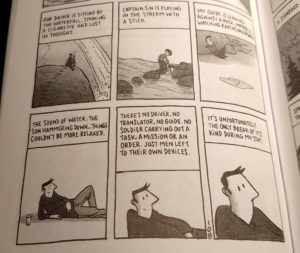 The moment touches on something that is not only quite charming, but possibly quite profound, too. But it flickers out again and descends into «white tourist mode» again.
The moment touches on something that is not only quite charming, but possibly quite profound, too. But it flickers out again and descends into «white tourist mode» again.
I could have saved myself the trouble had I bothered to read the reviews on Goodreads before starting the book, so if you’d like more examples, go have a nosey. I’m hardly the only one who’ve ended up wanting to throw the book across the room, it seems.
Boka har jeg lånt på biblioteket.
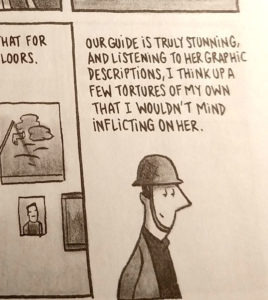
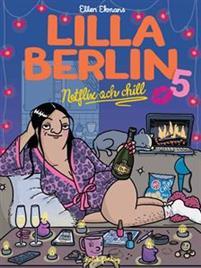
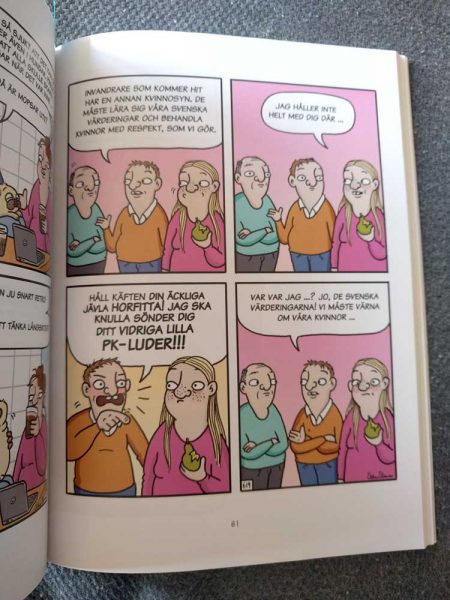
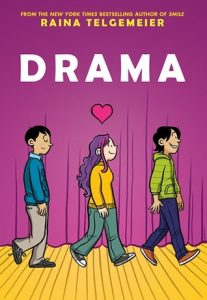 The book
The book  The series The Baby-Sitters Club by Raina Telgemeier is a great comic book series, that I love. The main characters are Kristy, Stacey, Mary Anne, Claudia and Dawn. Dawn joins in the third book but the others where there from the start.
The series The Baby-Sitters Club by Raina Telgemeier is a great comic book series, that I love. The main characters are Kristy, Stacey, Mary Anne, Claudia and Dawn. Dawn joins in the third book but the others where there from the start.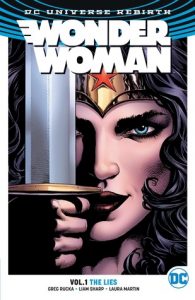
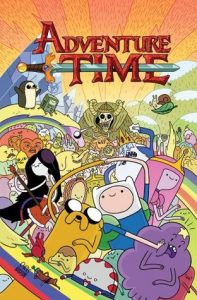 Adventure Time is about two super broes who go on adventures and their names are Finn and Jake. Finn is in love with Princess Bubblegum, who is half bubblegum, and Jake is a dog.
Adventure Time is about two super broes who go on adventures and their names are Finn and Jake. Finn is in love with Princess Bubblegum, who is half bubblegum, and Jake is a dog.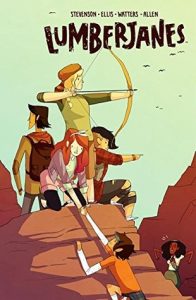 For å ta Lumberjanes først. Jeg har lest volum 1 før (selvsagt), og var litt ambivalent til det, men synes det var interessant nok til å gi meg i kast med toern. Konseptet for Lumberjanes er egentlig ganske rett frem, vi følger en gjeng jenter som deler hytte på en sommerleir. «Lumberjanes» er nærmest en slags speiderbevegelse, og hvert kapittel har et slags utgangspunkt i beskrivelsen av hva deltagerne må mestre for å oppnå en «badge». Så langt høres det ganske prosaisk ut, men det er det altså egentlig ikke. For det første er beskrivelsene av hva en Lumberjane må kunne ikke akkurat noe du ville funnet i en normal leirhåndbok, for det andre er hendelsene i tegneserien definitivt ikke noe du ville opplevd på en normal sommerleir. «Overnaturlig» er vel egentlig bare forbokstaven. Årsaken til at jeg er ambivalent er todelt, det ene er at hendelsene virker litt… tilfeldige. En del som var uklart i volum en fikk riktignok en slags forklaring i volum to, så kanskje jeg bare må fortsette å lese. Det andre er at hovedtråden i fortellingen later til å være vennskap og lojalitet, jeg tolker det i alle fall dithen at det er vennskap forfatterne ønsker å si noe om, men selv om jeg altså tolker det dithen synes jeg det temaet drukner litt i alle de sprø, og altså tilsynelatende litt tilfeldige, tingene som skjer. Likevel, jeg er fortsatt interessert nok til at jeg sikkert kommer til å låne volum 3 også.
For å ta Lumberjanes først. Jeg har lest volum 1 før (selvsagt), og var litt ambivalent til det, men synes det var interessant nok til å gi meg i kast med toern. Konseptet for Lumberjanes er egentlig ganske rett frem, vi følger en gjeng jenter som deler hytte på en sommerleir. «Lumberjanes» er nærmest en slags speiderbevegelse, og hvert kapittel har et slags utgangspunkt i beskrivelsen av hva deltagerne må mestre for å oppnå en «badge». Så langt høres det ganske prosaisk ut, men det er det altså egentlig ikke. For det første er beskrivelsene av hva en Lumberjane må kunne ikke akkurat noe du ville funnet i en normal leirhåndbok, for det andre er hendelsene i tegneserien definitivt ikke noe du ville opplevd på en normal sommerleir. «Overnaturlig» er vel egentlig bare forbokstaven. Årsaken til at jeg er ambivalent er todelt, det ene er at hendelsene virker litt… tilfeldige. En del som var uklart i volum en fikk riktignok en slags forklaring i volum to, så kanskje jeg bare må fortsette å lese. Det andre er at hovedtråden i fortellingen later til å være vennskap og lojalitet, jeg tolker det i alle fall dithen at det er vennskap forfatterne ønsker å si noe om, men selv om jeg altså tolker det dithen synes jeg det temaet drukner litt i alle de sprø, og altså tilsynelatende litt tilfeldige, tingene som skjer. Likevel, jeg er fortsatt interessert nok til at jeg sikkert kommer til å låne volum 3 også.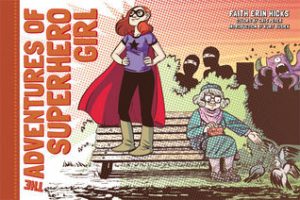
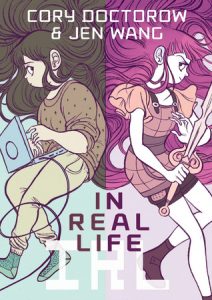 Real Life skiller seg litt fra de andre to i at handlingen faktisk er virkelighetsnær. Hovedpersonen, Anda, begynner å spille et online multispiller spill og blir etterhvert rekruttert til å være med i en slags patrulje som jakter på gullgravere, spillere som kun er i spillet for å generere inntekter (akkurat hvordan dette fungerer har jeg ikke helt skjønt, men jeg har hørt om fenomenet). Siden gullgraving er mot reglene i spillet føler Anda seg først som en slags helt, men så blir hun kjent med en av de hun jakter på og oppdager at dette er unge kinesere som er ansatt på luselønn for å gjøre denne jobben. Når Andas nye venn i tillegg plutselig forsvinner, han har mistet jobben på dagen når det ble oppdaget at han kommuniserte med Anda, blir forskjellen på rett og galt en smule mer komplisert. Akkurat som i RL, kan man si. Både forteller- og tegnestilen fungerer godt, og boka bekrefter egentlig målsetningen min om å få lest noe mer av Doctorow.
Real Life skiller seg litt fra de andre to i at handlingen faktisk er virkelighetsnær. Hovedpersonen, Anda, begynner å spille et online multispiller spill og blir etterhvert rekruttert til å være med i en slags patrulje som jakter på gullgravere, spillere som kun er i spillet for å generere inntekter (akkurat hvordan dette fungerer har jeg ikke helt skjønt, men jeg har hørt om fenomenet). Siden gullgraving er mot reglene i spillet føler Anda seg først som en slags helt, men så blir hun kjent med en av de hun jakter på og oppdager at dette er unge kinesere som er ansatt på luselønn for å gjøre denne jobben. Når Andas nye venn i tillegg plutselig forsvinner, han har mistet jobben på dagen når det ble oppdaget at han kommuniserte med Anda, blir forskjellen på rett og galt en smule mer komplisert. Akkurat som i RL, kan man si. Både forteller- og tegnestilen fungerer godt, og boka bekrefter egentlig målsetningen min om å få lest noe mer av Doctorow.